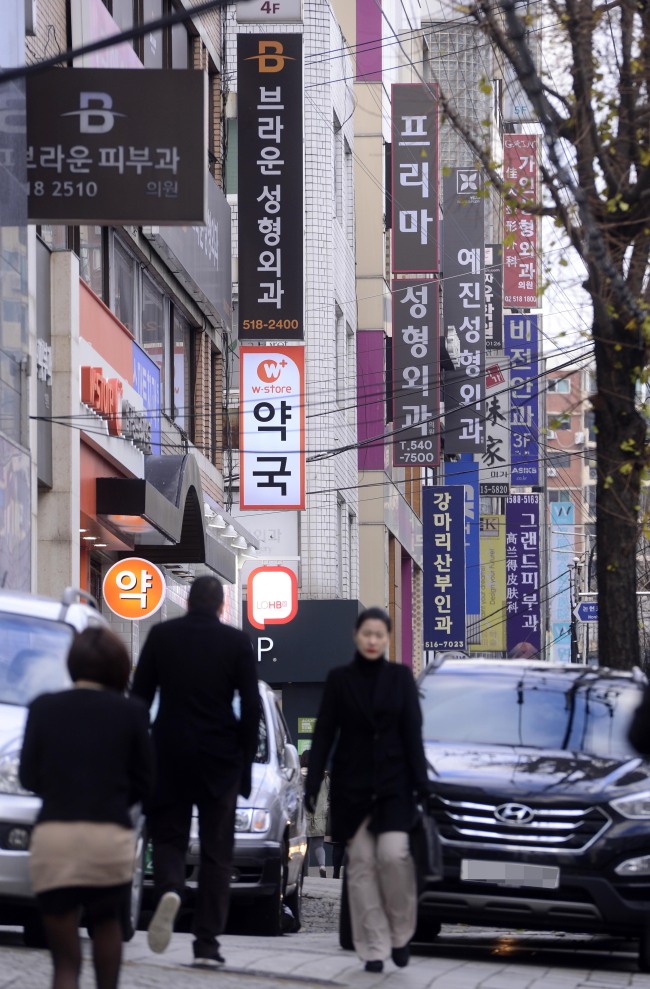The dark side of nip and tuck
Side effects of plastic surgery can affect career, mental health and more
By Chung Joo-wonPublished : Nov. 29, 2013 - 20:15

With cosmetic surgery common nationwide, so-called “modified faces” have become a regular sight in bustling areas such as Gangnam, Cheongdam-dong and Sinsa-dong.
But despite their vast popularity, cosmetic procedures can go awry just like any other medical procedure.
“I had a calf reduction done to become more attractive, but I got the worst out of it,” a woman wrote on Anti-Plastic Surgery Cafe, one of the largest online anti-plastic surgery communities.
The patient had her calf muscles involuted for slimmer legs, but ended up suffering acute pain.
“I freaked out when the people at the clinic said my muscle tissues had been partially ripped out,” she claimed.
Even more serious outcomes have been reported for double-jaw surgeries.
“My upper teeth are shaky and aching, and it left 11 teeth cut off from their nerves,” wrote a different woman on an anti-plastic surgery site. She’s now unable to chew, and the left and right side of her face are asymmetrical. “I want to kill myself,” she said.
Experts warn against the danger of risky surgeries, some of which could damage perfectly normal facial bone structures.
“Double-jaw surgery is difficult, and carries higher risks. It is recommended for people who have many functional problems of the face,” said a former cosmetic clinic consultant who now runs an anti-plastic surgery community.
Plastic surgery, when poorly performed, can place a crushing financial burden on patients who are already struggling with side effects. Worse, they often find themselves fighting against surgeons in complex medical disputes.
“The court tries to examine whether the surgeons did their best in explaining the potential adverse effects of the surgeries,” said Choi Chung-hee, a lawyer at Seseung, a law firm specialized in medical disputes. In a positive development for sufferers of serious side effects, courts nowadays tend to give more weight to the mental pain of patients.
But even if a patient wins his case against a doctor, compensation tends to be very small, according to case reports from the Korea Consumer Agency and court rulings.
In a dispute settlement case reported by the KCA in July, a hospital that did not completely remove the artificial prosthesis from a patient’s nose as requested was found only 50 percent responsible.
As more surgeries are performed and complex techniques are used, medical disputes are on the rise. Some doctors said the distorted image of beauty in Korea, often promoted through camera-perfect celebrities, is increasing the risks of plastic surgery.
“I have done breast enlargement surgeries, but I still do not understand women’s desire to have both a skinny body and large breasts,” said a plastic surgeon who used to work at a large cosmetic clinic chain in Gangnam.
“Some patients say they want to have noses that look exactly the same as certain TV celebrities, but it is almost impossible to make a perfect replica. Frankly, I think a surgery is successful when the final result has roughly 70 percent or higher synchronicity with the desired goal,” he said.
Psychiatrists said some individuals want to have surgery believing that their looks are the cause of their depression.
“Many people unknowingly seek cosmetic surgery out of an adjustment disorder, rather than depression caused by unsatisfactory looks,” said Yang Jae-jin, a psychiatrist and director of Jin Hospital. Yang was one of the panel members of “Let Me In 3,” a popular makeover TV show.
According to Yang, it is foolish to have plastic surgery as an ultimate solution for unhappiness.
“Patients must look into all possible outcomes, both positive and negative, before making a decision,” he said.
By Chung Joo-won (joowonc@heraldcorp.com)


















